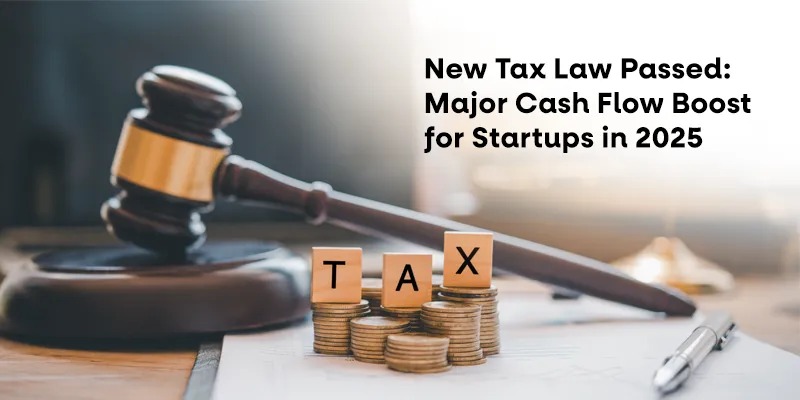
There's been a huge buzz in the tax arena about the One Big Beautiful Bill since March this year, and the changes it is likely to usher in. The bill was brought in as a follow-up to the Tax Cuts and Jobs Act of 2017 and was signed into law as the One Big Beautiful Bill Act (OBBBA) on July 4, 2025. But don't mistake this Act to be your average tax update. It's a potential game-changer that is likely to redefine how businesses innovate, invest, and accelerate growth in the years ahead. It brings good news for most small business owners and startups, unlocking immediate tax relief and retroactive refunds that could dramatically improve liquidity for early-stage companies. We take a look at the impact the act is likely to have on startup cash flows.
How the One Big Beautiful Bill Act 2025 Impacts Your Cash Flows
Immediate Expensing: A Game-Changer for R&D-Heavy Startups
If you were a startup owner before the OBBBA, you would have had to amortize domestic R&D costs over five years under Section 174, delaying your deductions and inflating taxable income. With the OBBBA coming into effect, you can now fully deduct R&D expenses in the year they're incurred, thus bringing a vital cash flow lever that had been out of reach since 2022 within your grasp. This shift means will ensure you have more working capital to fund product development, hire talent, and extend your business runway.
Retroactive Refunds: Reclaiming Lost Value
The OBBBA designates startups with average annual gross receipts under $31 million as “Small Business Taxpayers”. Such businesses have been permitted to file amended returns to deduct R&D costs from 2022 to 2024 retroactively. This means if your business qualifies, you will be eligible for real cash refunds for taxes already paid under the old rules. Alternatively, you can also opt for a one-time catch-up deduction in 2025 or 2026, further simplifying the process while still recovering value.
Advanced Manufacturing Investment Credit
This is a refundable tax credit designed to incentivize investment in advanced manufacturing facilities, especially for businesses producing semiconductors or semiconductor manufacturing equipment. The original CHIPS Act credit rate of 25% of the cost of qualified property placed in service has been increased from 25% to 35%, making it significantly more attractive for manufacturers. This ensures you receive a direct dollar-for-dollar reduction in federal tax liability, which can be a major capital source if you wish to invest in clean energy and tech infrastructure. It also helps level the playing field against foreign competitors who benefit from faster permitting and state-backed subsidies.
Pass-Through Deduction Under IRC Sec. 199A
The OBBBA permanently extends the pass-through deduction under IRC Sec. 199A, allowing eligible owners of businesses like sole proprietorships, partnerships, and S corporations to deduct up to 20% of qualified business income (QBI) from their federal taxes. This again will contribute To the cash flows of small businesses. While this TCJA provision was originally slated to expire after 2025, the OBBBA amendment has placed phase-out thresholds that, once exceeded, will lead to the deduction gradually reducing and being limited or eliminated for specified service trades or businesses (SSTBs), such as law, accounting, and healthcare. Additionally, businesses above the threshold must meet W-2 wage and property tests to maintain eligibility. This move provides long-term certainty for small business tax planning while targeting benefits toward middle-income entrepreneurs and reinforcing compliance standards.
Easier Equipment Expensing for Growing Businesses
The OBBBA makes it much easier for startups to hold on to their cash. Businesses can now expense up to $2.5 million worth of qualifying equipment right off the bat—no need to spread deductions over years. Plus, the phase-out threshold has been increased to $4 million, meaning even companies making bigger investments still get a solid tax break. It's a big win for cash flow and smart upgrades. The net outcome is that faster write-offs will ensure stronger cash flows and more money to reinvest in innovation, hiring, or scaling.
These are just a few of the strategic opportunities the OBBBA offers startups. Founders should revisit past filings, assess eligibility, and work with advisors to optimize their business expensing strategies going forward. Whether you're pre-revenue or scaling fast, the OBBBA offers a rare chance to strengthen your financial foundation without raising capital. It's putting real money back into the hands of innovators. If your startup is building something bold, now's the time to make sure your tax strategy is just as forward-thinking.
FINLOTAX: UNLOCKING TAX INCENTIVES FOR STARTUPS IN 2025
Get ready to unlock the full potential of the One Big Beautiful Bill Act with FinloTax! At FinloTax, we specialize in guiding startups through every nuance of tax credits and expensing opportunities. Our experts will help you identify missed opportunities, maximize refunds, and fortify your cash flow—without the confusion. Don't just stay compliant—stay ahead. Reach out at 4088229406 and let us turn policy into profit for your business today.

